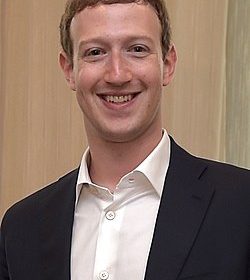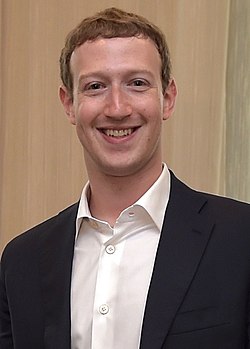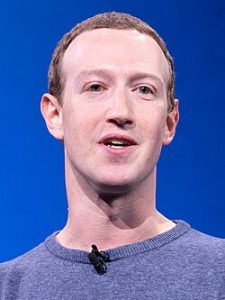| Mark Zuckerberg | |
|---|---|
Zuckerberg in 2019 | |
| Date of Birth | May 14, 1984 (Age 41) |
| Place of Birth | White Plains, New York, U.S. |
| Also Known As | Zuck |
| Education | Harvard University (dropped out) |
| Occupations | Entrepreneur, Computer Programmer |
| Years Active | 2004 – present |
| Titles | – Co-founder, Chairman & CEO of Meta Platforms and Facebook – Co-founder & Co-CEO of the Chan Zuckerberg Initiative |
| Spouse | Priscilla Chan (married in 2012) |
| Children | 3 |
| Relatives | Randi Zuckerberg (sister), Donna Zuckerberg (sister) |
| Official Website | |
| Signature |  |
| Biography | Mark Elliot Zuckerberg (born May 14, 1984) is an American entrepreneur and computer programmer who co-founded the social media platform Facebook, as well as its parent company, Meta Platforms, where he currently serves as chairman, chief executive officer (CEO), and majority shareholder. Throughout his career, Zuckerberg has faced numerous legal disputes related to the creation and ownership of Facebook, along with ongoing controversies concerning user privacy and data management. Zuckerberg was born in White Plains, New York, and briefly studied at Harvard University, where in February 2004, he launched Facebook alongside his college roommates Eduardo Saverin, Andrew McCollum, Dustin Moskovitz, and Chris Hughes. Originally intended as a networking site for Harvard students, the platform quickly expanded to other universities and then to the general public, becoming one of the most influential social media services in the world. In May 2012, Zuckerberg led Facebook through its initial public offering (IPO), maintaining control through a majority of voting shares. In 2008, at the age of 23, he became the youngest self-made billionaire in history. Over the years, he has remained among the wealthiest individuals globally. As of May 2025, according to Forbes, his net worth is estimated at $221.2 billion, ranking him as the second-richest person in the world. Beyond his business ventures, Zuckerberg has directed substantial resources toward philanthropy. Along with his wife, Priscilla Chan, he co-founded the Chan Zuckerberg Initiative in 2015, aiming to promote science, education, healthcare, and equal opportunity. The couple, married since 2012, has three children. Zuckerberg also has two sisters, Randi Zuckerberg, a former Facebook executive, and Donna Zuckerberg, a writer and academic. Zuckerberg’s rapid rise in the tech industry has made him a subject of global attention, b |
Early Life and Education
Mark Elliot Zuckerberg was born on May 14, 1984, in White Plains, New York, to Karen Kempner, a psychiatrist, and Edward Zuckerberg, a dentist. He grew up in a Reform Jewish household in Dobbs Ferry, New York, alongside his three sisters: Arielle, Randi, and Donna. His great-grandparents immigrated from Austria, Germany, and Poland, giving him European Jewish ancestry.
Zuckerberg began his education at Ardsley High School before transferring to Phillips Exeter Academy, a prestigious prep school, where he served as captain of the fencing team.
Early Interest in Software Development
From a young age, Zuckerberg showed a strong interest in computers and programming. Around the age of eleven, he developed a messaging program called ZuckNet, which allowed computers in his family’s home and his father’s dental practice to communicate with each other—effectively an early version of instant messaging for internal use.
During his high school years, Zuckerberg created a music player called the Synapse Media Player, which used machine learning to analyze users’ listening habits and make recommendations. The software was posted to Slashdot, a popular tech news site, and received a 3 out of 5 rating from PC Magazine. As The New Yorker once described, “Some kids played computer games. Mark created them.” At the same time, he took a graduate-level computer science course at Mercy College in the evenings while still attending high school.
Harvard University and the Roots of Facebook
By the time Zuckerberg arrived at Harvard University in 2002, he had already earned a reputation as a gifted programmer. He studied psychology and computer science, lived in Kirkland House, and was a member of the Jewish fraternity Alpha Epsilon Pi.
In his sophomore year, Zuckerberg created a tool called CourseMatch, which helped students choose classes based on the courses selected by their peers and allowed them to organize study groups.
Later, he developed a second program, initially called Facemash, which allowed Harvard students to compare photos of classmates and vote on who they found more attractive. The idea was based on printed “face books” used in student dorms that included photos and names of residents. His roommate at the time, Arie Hasit, recalled:
“We had books called ‘Face Books’, which included the names and pictures of everyone who lived in the student dorms. At first, he built a site and placed two pictures, or pictures of two males and two females. Visitors to the site had to choose who was ‘hotter,’ and according to the votes there would be a ranking.”
The site was launched over a weekend, but its immense popularity crashed part of Harvard’s network infrastructure by Monday morning, causing the university to shut it down. The project sparked controversy, as it used student photos without permission and drew criticism from both students and campus publications. Zuckerberg issued a public apology, and The Harvard Crimson reported that the website was “completely improper.”
History and Development of Facebook
In January 2004, Mark Zuckerberg began coding a new social networking website. On February 4, 2004, he launched
“Thefacebook” (thefacebook.com) together with his roommates Eduardo Saverin, Andrew McCollum, Dustin Moskovitz, and Chris Hughes.
The concept was partly inspired by the “Photo Address Book,” a student directory used at Phillips Exeter Academy, Zuckerberg’s prep school,
which allowed students to share photos and personal details.
Just six days after launching, three Harvard students—Cameron and Tyler Winklevoss and Divya Narendra—accused Zuckerberg of misleading them
about collaborating on HarvardConnection.com, while using their idea to build a competing site. They filed a lawsuit that was later settled
with Zuckerberg agreeing to pay 1.2 million Facebook shares and $20 million in cash.
Initially exclusive to Harvard, Facebook quickly expanded to other universities including Columbia, NYU, Stanford, Dartmouth, Cornell, University of Pennsylvania, Brown, and Yale.
Zuckerberg dropped out of Harvard during his sophomore year to focus on Facebook full-time. Along with co-founder Dustin Moskovitz and others,
he moved to Palo Alto, California, where they rented a small house that served as their first office. Early investor Peter Thiel supported the company financially in 2004.
Although they planned to return to Harvard, the team decided to stay in Silicon Valley, valuing the region’s technology culture.
Facebook declined major acquisition offers to preserve their mission of creating an open flow of information rather than being absorbed by media conglomerates.
In 2007, Zuckerberg publicly stated his preference for hiring young people, asserting they were “just smarter.”
Mission and Culture
Zuckerberg’s stated mission is “making the world open.” He has emphasized transparency and access to information as Facebook’s core values.
The company embraced a hacker culture, regularly hosting hackathons—events where employees build projects overnight, fostering rapid innovation.
Zuckerberg actively participates in these hackathons.
Achievements and Recognition
- By July 2010, Facebook had reached 500 million users.
- Zuckerberg was recognized in 2007 by MIT Technology Review as one of the top 35 innovators under 35.
- Vanity Fair named him the most influential person of the Information Age in 2010.
- He ranked highly in New Statesman’s 2010 list of the world’s 50 most influential people.
Global Influence and Challenges
In 2012, Zuckerberg met Russian Prime Minister Dmitry Medvedev to promote social media innovation in Russia.
Facebook had approximately 9 million users in Russia, competing with the local platform VK. Zuckerberg’s Facebook profile was hacked in 2013.
At the 2013 TechCrunch Disrupt conference, he announced efforts to connect the 5 billion people without internet access via the Internet.org project.
He was the keynote speaker at the 2014 Mobile World Congress, highlighting Facebook’s focus on mobile technology and internet expansion in developing countries.
Zuckerberg engaged with Chinese tech officials and entrepreneurs despite Facebook being banned in China, showing his interest in nurturing entrepreneurship there.
He frequently communicates directly with Facebook users, holding live Q&A sessions.

Personal and Professional Details
- Zuckerberg takes a symbolic $1 annual salary as CEO.
- Alongside his wife, he pledged to donate 99% of their wealth.
- In 2017, Harvard awarded him an honorary degree.
- In 2019, he announced plans to integrate end-to-end encryption across Facebook, Instagram, and WhatsApp.
- In 2020, Facebook merged chat functions of Instagram and Messenger to allow cross-platform communication.
Other Projects
In 2004, Zuckerberg and collaborators launched Wirehog, a peer-to-peer file sharing service, as a precursor to Facebook Platform apps.
Internet.org, launched in 2013, aims to provide internet access globally but faced criticism and was shut down in India over net neutrality concerns.
Zuckerberg is a board member of Breakthrough Starshot, a project to develop solar sail spacecraft, co-founded with Yuri Milner and Stephen Hawking.
See also: Criticism of Facebook
ConnectU lawsuits
Harvard students Cameron Winklevoss, Tyler Winklevoss, and Divya Narendra accused Mark Zuckerberg of misleading them into believing he would help build a social network called HarvardConnection.com (later renamed ConnectU). They filed a lawsuit in 2004, which was dismissed on a technicality in 2007 but was soon refiled in a federal court in Boston. Facebook countersued concerning Social Butterfly, a project by the Winklevoss Chang Group, allegedly a partnership between ConnectU and i2hub. On June 25, 2008, the case was settled with Facebook agreeing to transfer over 1.2 million shares and pay $20 million in cash.
In November 2007, confidential court documents including Zuckerberg’s Social Security number, his parents’ home address, and his girlfriend’s address were posted on the website of 02138, a Harvard alumni magazine. Facebook sought to have the documents removed, but the judge ruled in favor of 02138.
Eduardo Saverin
In 2005, Facebook co-founder Eduardo Saverin filed a lawsuit against Zuckerberg and Facebook, alleging misuse of his money for personal expenses. The lawsuit was settled out of court; although the settlement terms were confidential, Saverin retained his co-founder title and agreed to stop speaking publicly about the matter.
Pakistan criminal investigation
In June 2010, Pakistan’s Deputy Attorney General Muhammad Azhar Sidiqque launched a criminal investigation against Zuckerberg and co-founders Dustin Moskovitz and Chris Hughes following a “Draw Muhammad” contest hosted on Facebook. The investigation also named the anonymous German woman who created the contest. Authorities requested Interpol to arrest the four for blasphemy. Facebook was temporarily blocked in Pakistan until the contest was removed. The issue was also raised at the United Nations General Assembly by Pakistan’s UN representative.
Paul Ceglia
In June 2010, Paul Ceglia, owner of a wood pellet fuel company in New York, filed a lawsuit claiming 84% ownership of Facebook based on a contract allegedly signed with Zuckerberg in 2003. The contract purportedly entitled Ceglia to 50% of the site’s revenue plus an increasing interest. Facebook dismissed the suit as frivolous. In October 2012, Ceglia was arrested and charged with mail and wire fraud, accused of fabricating emails to support his claims. Following his arrest, several law firms withdrew from the case.
Hawaiian land ownership
In 2014, Zuckerberg purchased 700 acres on Kauaʻi island in Hawaii. In 2017, he filed multiple lawsuits to claim small parcels of land within his property that were owned by native Hawaiians. After public criticism and realizing Hawaiian land laws differed from other states, Zuckerberg dropped the lawsuits, expressing regret for not understanding the history and legal complexities beforehand.
Testimony before U.S. Congress
On April 10–11, 2018, Zuckerberg testified before the U.S. Senate Committee on Commerce, Science, and Transportation about Facebook’s handling of personal data amid the Cambridge Analytica scandal. He described the affair as a breach of trust involving Aleksandr Kogan, Cambridge Analytica, and Facebook. Zuckerberg declined to appear before the UK Parliamentary committee on the matter.
On October 1, 2020, the U.S. Senate Commerce Committee issued subpoenas to Zuckerberg, Google’s Sundar Pichai, and Twitter’s Jack Dorsey to testify about Section 230 legal immunity protecting tech platforms. Republican lawmakers argued the law shields social media companies from accusations of anti-conservative censorship.
On March 25, 2021, Zuckerberg testified before the House Energy and Commerce Committee about Facebook’s role in spreading misinformation and hate speech, its handling of user data, the January 6 Capitol attack, and efforts to combat harmful content. He acknowledged Facebook’s responsibility and outlined ongoing policy improvements.
In January 2024, during a Senate Judiciary Committee hearing on child safety and social media, Zuckerberg and other tech CEOs were questioned on their companies’ practices. He apologized to families of children harmed online.
Meta’s proposal
Court documents reveal Zuckerberg personally rejected proposals within Meta aimed at improving teenagers’ mental health on Facebook and Instagram. He overrode senior executives such as Instagram head Adam Mosseri and Global Affairs President Nick Clegg, resisting efforts to better protect over 30 million U.S. teens on Instagram. These internal communications, disclosed in a Massachusetts-initiated lawsuit, expose Zuckerberg’s significant influence over decisions affecting billions of users, highlighting tensions with other Meta officials advocating for user well-being improvements.
The Social Network
Further information: The Social Network

A movie based on Mark Zuckerberg and the founding years of Facebook, The Social Network, was released on October 1, 2010, starring Jesse Eisenberg as Zuckerberg. Upon learning about the film, Zuckerberg said, “I just wished that nobody made a movie of me while I was still alive.”[94] After the film’s script leaked online and it was clear the portrayal would not be entirely positive, he stated he wanted to be seen as a “good guy”.[95]
The film is based on the book The Accidental Billionaires by Ben Mezrich, which its publicist described as “big juicy fun” rather than straight “reportage”.[96] Screenwriter Aaron Sorkin told New York magazine, “I don’t want my fidelity to be the truth; I want it to be storytelling,” adding, “What is the big deal about accuracy purely for accuracy’s sake, and can we not have the true be the enemy of the good?”.[97]
When the film won the Golden Globe Award for Best Picture on January 16, 2011, producer Scott Rudin thanked Facebook and Zuckerberg “for his willingness to allow us to use his life and work as a metaphor through which to tell a story about communication and the way we relate to each other”.[98] Sorkin, who won Best Screenplay, later softened some impressions from his script:
I wanted to say to Mark Zuckerberg tonight, if you’re watching, Rooney Mara’s character makes a prediction at the beginning of the movie. She was wrong. You turned out to be a great entrepreneur, a visionary, and an incredible altruist.
In January 2011, Zuckerberg made a surprise guest appearance on Saturday Night Live, hosted by Jesse Eisenberg. They both said it was the first time they met.[100] Eisenberg asked Zuckerberg, who had been critical of his portrayal, what he thought of the movie. Zuckerberg replied, “It was interesting.”[101] Eisenberg later said he was “nervous to meet him, because I had spent now, a year and a half thinking about him…”. He added, “Mark has been so gracious about something that’s really so uncomfortable… The fact that he would do SNL and make fun of the situation is so sweet and so generous. It’s the best possible way to handle something that, I think, could otherwise be very uncomfortable.”[102][103]
Disputed accuracy
David Kirkpatrick, former technology editor at Fortune magazine and author of The Facebook Effect (2011), stated that the film is “only 40% true” and that Zuckerberg “is not snide and sarcastic in a cruel way, the way Zuckerberg is played in the movie.” He noted many factual incidents are accurate but the overall impression is false, concluding Zuckerberg’s primary motivation was to create a new way to share information online.[104][105]
Although the film shows Zuckerberg creating Facebook to improve his social status after failing to get into elite Harvard clubs, Zuckerberg said he had no interest in those clubs.[6] Kirkpatrick agreed this portrayal is false. Former Facebook senior engineer Karel Baloun called the image of Zuckerberg as a socially awkward nerd “fiction” and rejected the idea that Zuckerberg would betray friends deliberately.[105]
Other depictions
Zuckerberg voiced himself in an episode of The Simpsons titled “Loan-a Lisa” (October 3, 2010), where he encouraged Lisa Simpson that college graduation is not necessary for success, citing Bill Gates and Richard Branson.[106] On October 9, 2010, Saturday Night Live lampooned Zuckerberg and Facebook with Andy Samberg as Zuckerberg; Zuckerberg reportedly found it funny.[107][108]
Stephen Colbert awarded Zuckerberg a “Medal of Fear” at the Rally to Restore Sanity and/or Fear on October 30, 2010, joking that Zuckerberg values his privacy more than others’.[109] Zuckerberg appeared in the 2013 documentary Terms and Conditions May Apply[110][111][112], and was mocked in a South Park episode titled “Franchise Prequel” where he was portrayed as a quirky nerd who appears unexpectedly in people’s homes.[113]
Zuckerberg’s Philanthropy and Donations
Mark Zuckerberg founded the Startup:Education foundation. In September 2010, he reportedly donated $100 million to the Newark Public Schools in New Jersey. Critics questioned the timing of the donation, which coincided with the release of The Social Network. Zuckerberg responded:
“The thing that I was most sensitive about with the movie timing was, I didn’t want the press
about The Social Network movie to get conflated with the Newark project. I was thinking about doing this anonymously just so that the two things could be kept separate.”
Newark Mayor Cory Booker and New Jersey Governor Chris Christie had to persuade Zuckerberg’s team not to donate anonymously. However, journalist Dale Russakoff reported that much of the donation was largely wasted.
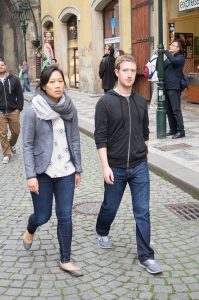
The Giving Pledge
In 2010, Zuckerberg, alongside Bill Gates and Warren Buffett, signed The Giving Pledge, committing to donate at least half of their wealth to charitable causes. In December 2012, Zuckerberg and his wife Priscilla Chan pledged to donate most of their wealth to advance human potential and promote equality.
Notable Donations
- December 2013: Donated 18 million Facebook shares (worth $990 million) to the Silicon Valley Community Foundation. It was the largest charitable gift recorded that year.
- October 2014: Donated $25 million to combat the Ebola virus epidemic in West Africa.
- February 2015: Donated $75 million to San Francisco General Hospital, which was renamed The Priscilla Chan and Mark Zuckerberg San Francisco General Hospital and Trauma Center. In 2020, a non-binding resolution by the city’s board criticized the naming due to concerns over Facebook’s societal impact.
Chan Zuckerberg Initiative (CZI)
On December 1, 2015, Zuckerberg and Chan announced they would transfer 99% of their Facebook shares (then worth $45 billion) over their lifetime to the Chan Zuckerberg Initiative (CZI). Unlike traditional charitable foundations, CZI was set up as a limited liability company (LLC), allowing greater control and flexibility. Some critics have labeled its model as philanthrocapitalism.
Chan Zuckerberg Biohub
In 2016, CZI committed $600 million to launch the Chan Zuckerberg Biohub, a collaborative research center based in San Francisco’s Mission Bay. The Biohub brings together scientists from UCSF, UC Berkeley, and Stanford. Unlike fully open-access models like the Gates Foundation, Biohub retains commercial rights to research results, though inventors may choose open-source release with approval.
Biohub also promotes open science by requiring preprint publication of research manuscripts on platforms like bioRxiv.
COVID-19 Response
During the COVID-19 pandemic, Zuckerberg announced $25 million in grants to support struggling local journalism and $75 million in Facebook advertising purchases in local newspapers to promote the platform while aiding the industry.
Zuckerberg’s Public and Political Involvement
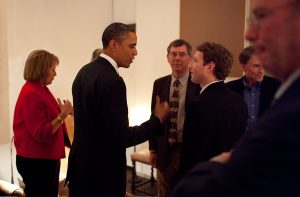
(Official White House Photo by Pete Souza)
This official White House photograph is being made available only for publication by news organizations and/or for personal use printing by the subject(s) of the photograph. The photograph may not be manipulated in any way and may not be used in commercial or political materials, advertisements, emails, products, promotions that in any way suggests approval or endorsement of the President, the First Family, or the White House.
In 2002, Mark Zuckerberg registered to vote in Westchester County, New York, but he did not vote until November 2008. As of 2012, he was listed as “no preference” in voter rolls, having voted in at least two of the previous three general elections.
Zuckerberg has never publicly stated his political affiliation or voting record. In 2013, he hosted fundraising events for New Jersey Governor Chris Christie and Newark Mayor Cory Booker, particularly due to their focus on education reform. He previously pledged $100 million to the Newark Public Schools in 2010.
FWD.us and Immigration Reform
On April 11, 2013, Zuckerberg launched FWD.us, a political advocacy group focused on:
- Immigration reform
- U.S. education improvement
- Technological advancement
The group received criticism for financing political ads supporting oil drilling, the Keystone XL pipeline, and other conservative issues. Liberal organizations such as MoveOn.org and The Sierra Club protested by pausing or removing ads from Facebook.
In a Facebook post, Zuckerberg defended the group’s intentions, stating:
“The bigger problem we’re trying to address is ensuring the 11 million undocumented folks living in this country now and similar folks in the future are treated fairly.”
LGBTQ+ Support and PRISM Scandal
In June 2013, Zuckerberg joined Facebook employees at the San Francisco LGBT Pride parade. Participation grew from 70 employees in 2011 to 700 in 2013. This followed a Supreme Court ruling striking down DOMA.
Following the PRISM surveillance revelations, Zuckerberg criticized the U.S. government, saying it “blew it” in protecting citizens’ freedoms and company trust.
Support for Muslims and Black Lives Matter
In December 2015, Zuckerberg publicly supported Muslims following global terrorist attacks, stating:
“Muslims are always welcome on Facebook… As a Jew, my parents taught me that we must stand up against attacks on all communities.”
In February 2016, Zuckerberg rebuked Facebook employees who had crossed out “Black Lives Matter” messages on company walls. He described the act as “malicious” and “silencing speech”, and said investigations would follow.
Policy Stances and Political Shifts
- In 2017, Zuckerberg criticized Donald Trump’s immigration ban executive order.
- In 2020, he funded a California ballot initiative to revise commercial property tax laws.
- Initially perceived as progressive, he later expressed regret over content moderation under the Biden administration and began discouraging employee activism at Meta.
By 2024, Zuckerberg described his views as leaning toward libertarianism or classical liberalism.
Relationship with Donald Trump
In his 2024 book, Save America, Donald Trump warned that Zuckerberg would face prison if he “cheated” in the 2024 election. Despite this, Zuckerberg met with Trump at Mar-a-Lago post-election, aiming to improve relations. Around the same time, Meta reportedly donated $1 million to a Trump-linked fund.
In January 2025, Zuckerberg expressed optimism under the new Trump administration, saying:
“We now have a U.S. administration that is proud of our leading companies… and will defend our values and interests abroad.”
He was prominently present at Trump’s 2025 inauguration and sought a favorable settlement in a $30 billion FTC antitrust case.
Mark Zuckerberg – Biography
👨👩👧 Marriage and Children
Mark Zuckerberg met Priscilla Chan at Harvard in 2003. She later became a doctor at the University of California, San Francisco, and moved into his house in Palo Alto in 2010. They married on May 19, 2012.
- First daughter: December 2015 (Chinese name: Chen Mingyu)
- Second daughter: August 2017
- Third daughter: March 2023
The couple also owns a Puli dog named Beast (over 2 million followers on Facebook). In 2024, Zuckerberg commissioned a statue of his wife by artist Daniel Arsham.
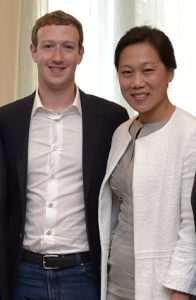 Recognition and Public Image
Recognition and Public Image
- Time Person of the Year: 2010
- Named among the most influential people: 2008, 2011, 2016, 2019, 2025
- 8th richest American (2023): $106 billion
- 2nd richest person globally (Oct. 2024)
- Estimated net worth: $219 billion (Dec. 2024)
Despite advocating for climate action, Zuckerberg purchased a $300 million mega-yacht in 2024, which emits 40 tons of CO₂ per hour. That same year, he adopted a new fashion style with gold chains and streetwear, sparking political commentary.
🕍 Religious Beliefs
Raised in a Reform Jewish household, Zuckerberg identified as an atheist in his youth. In 2016, he said that “religion is very important.” In 2017, he and his wife toured all 50 U.S. states to meet Facebook users and learn about their lives.
🥋 Personal Interests & Martial Arts
Since 2022, Zuckerberg has trained in martial arts:
- May 2023: Won gold and silver medals in Brazilian Jiu-Jitsu (beginner category)
- July 2023: Earned blue belt in BJJ
- November 2023: Suffered ACL injury before his planned MMA debut
